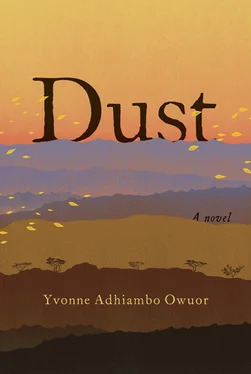In Ajany, a feeling as if her name had become tactile; she reaches for the sensation and glimpses tendrils of brother, strings thrown into this life from another dimension. She pulls at it and wraps the cord around her wrist. “Come, Odi.” A murmur.
Nyipir rubs his eyes before folding himself into the car.
Ajany follows.
They settle in, hugging beige seats, suffused by new-car-in-a-bottle smells. Leonard puts the vehicle into gear. No one acknowledges the pulsating ghost next to them. Like all the others, it is molded out of entombed silences.
Ali Dida Hada, the mortuary attendant, and Dr. Mda watch the white hearse’s departure. They also hear the sudden and explosive rhythms of a country shooting its people and tearing out its own heart. The mortuary attendant wrinkles his nose. “ Aieee! So much work … and before the new year. Now, when do I see my ma?”

Massive purple clouds rush in from the eastern coast. Ambushed by a warm wind in Nairobi, they scatter, a routed guerrilla force. At Wilson Airport, a qhat -carrying eight-seater plane weaves its way off the apron. The last small plane out of Nairobi without top-level permission for the next week. Above the airport din, egrets circle and ibises cry nganganganga . Father, daughter, and son are going home.
Dusk is Odidi’s time. In the contours of old pasts, Ajany retrieves an image: She is sitting on a black-gray rock, spying on the sun’s descent with Odidi. Leaning into his shoulder, trying to read the world as he does, she stammers, “Where’s it going?” He says, “Descending into hell,” and cackles. She had only just learned the Apostles’ Creed.
The plane lifts off.
The coffin and its keepers are nestled amid bales of green herbs. Straight-backed, stern, silences reordered, Nyipir is a chiseled stone icon again, an archetypal Nilotic male. But there are deep furrows on his forehead. She can paint these, too. Trail markers into absence. Ajany had once believed Baba was omnipotent, like God, ever since he had invoked a black leopard to hunt down the mean and red-eyed inhabitants of her nightmares.
She trembles.
Nyipir asks, “Cold?”
Baba’s baritone, Odidi’s echo. Dimpled handsomeness. The Oganda men were gifted with soft-edged, rumbling voices.
Ajany turns. The light of the sky bounces on her thin face, all bones and angles. Fresh bloodstains on her sleeves. The frills of her orange skirt are soiled. She is tinier than Nyipir remembers. But she had always been such a small, stuttering thing, all big hair and large eyes. More shadow than person, head slanted as if waiting for answers to ancient riddles. He clears his throat. From the gloom of his soul, Nyipir growls, “Mama … er … she wanted to … uh … come to meet you.”
Ajany hears the lie. Sucks it in, as if it were venom, sketches invisible circles on the window. Stares at the green of coffee and pineapple plantations below.
“Yes,” Nyipir says to himself, already lost, already afraid. He shifts. The dying had started long ago. Long before the murder of prophets named Pio, Tom, Argwings, Ronald, Kungu, Josiah, Ouko, Mbae. The others, the “disappeared unknown.” National doors slammed over vaults of secrets. Soon the wise chose cowardice, a way of life: not hearing, not seeing, never asking, because sound, like dreams, could cause death. Sound gave up names, especially those of friends. It co-opted silence as an eavesdropper; casual conversations heard were delivered to the state to murder. In time neighborhood kai-apple fences were urged into thicker and higher growth to shut out the dread-filled nation. But some of the lost, the unseen and unheard, cut tracks into Nyipir’s sleep. They stared at him in silence until the day his disordered dreams stepped into daylight with him to become his life:
They had pointed a gun to his head.
Click, click, click .
He had fallen to the ground, slithered on his belly like a snake, hissed, and vomited, because he had forgotten how to talk.
Today.
Sweat on palms, heartbeat quickening, Nyipir swallows. A groan. Ajany hears a father’s leaching anguish. She scratches an ache where it itches her skin, gropes inside-places as a tongue probing cavities does. Expecting to be stung.
Today.
The past’s beckon is persistent.
From the air, Nyipir peers down at an expanding abyss. His country, his home, is ripping itself apart. Stillborn ballot revolution. These 2007 elections were supposed to be simple, the next small jump into a light-filled Kenyan future. Everything had instead disintegrated into a single, unending howl by the nation’s unrequited dead. This country, this haunted ideal, all its poor, broken promises. Nyipir watches, armpits damp. A view of ground-lit smoke. Dry lips. His people had never set their nation on fire before.
On the ground, that night, in a furtive ceremony, beneath a half-moon, a chubby man will mutter an oath that will render him the president of a burning, dying country. The deed will add fuel to an already out-of-control national grieving.
Nyipir turns from the window.
He is flying home with his children.
Yet he is alone.
Memories are solitary ghosts.
He lets them in, traveling with them.
Downcountry.
December 12, 1963 .
Lengees, a soldier, hoisted a red, black, green, and white flag up in a park. The flag collected sparks, and visions drifting like clouds. In that arena of spectacle, Nyipir Oganda had led a cavalcade, lugging a smaller red, black, green, and white flag while riding on a high-stepping black horse. He had shrieked as if expelling a fiend:
“Eyeeeeees left!”
Clop-clop-clop-clop . Hooves and blurring vision. Men on a podium, some who he thought had died. Two men he knew had pounded other men to death. Another had been detained for his own safety and been supplied with a stream of world literature and unlovely comfort women, one of whom he married. He had focused on one man — Tom Joseph Mboya, who had colored in the red, green, white, and black flag. He had, years before, scoured the landscape and found promising souls that he sent to America to study, experience, and then come back home with transcendent dreams. The Leader of the Nation had tilted his head at the tracker-policeman carrying the Kenya flag, a dark man on a black horse. In his sweaty palms, the flag had almost slipped as Nyipir had bellowed, “Eyeeeees front!” A mosaic people had cheered. Wanderers, cattlemen, camel herders, fishermen and hunters, dreamers, strangers, gatherers and farmers, trading nations, empire builders, and the forgetful. Such were the people for whom Nyipir had carried the new Kenya flag. There was also the anthem created from a Pokomo mother’s lullaby:
Eh Mungu Nguvu Yetu
Ilete Baraka kwetu
Haki iwe ngao na mlinzi .…
O God of all creation, Bless this our land and nation, Justice be our shield and defender.…
Blended cultures, intoxicating fusion — the new, revised Kenya. Bead kofia on his head, cloaked, fly-whisk flicking, the Leader spoke. His voice was a bass drum. Glory! Goodness! Forgiveness! Education! Work hard! Nyipir had tended the fire-lit euphoria inside his body. Harambee! Harambee! A nation brought to task in a clarion call that had hauled steel across the land and built a railway. The national summons. Response — a howled Eeehhhhhh!
But then came the fear.
It split words into smaller and smaller fragments until words became secret, suffocating, and silent. No one cried when the voracious, frenzied seizing of lives began. A new word slithered into the landscape— Nyakua : plunder, possess. Entitled brigandage. But it was cleansed to mean “hard work.” In the nation, slow horror, as if all had woken up to a vision of violating, crowing ghouls crowding their beds. Nyipir remembers how bodies started to stoop to contain the shame, the loss, the eclipse. Such eyes-turned-inward silences so that when bodies started showing up mutilated and truly dead, the loudest protests were created out of whispers. To protect new post-independence citizen children, like most new Kenya parents denying soul betrayals, Nyipir built illusions of another Kenya, shouting out the words of the national anthem when he could as if the volume alone would remove the rust eating into national hopes. Keeping mouths, ears, and eyes shut, parents had partitioned sorrow, purchased even more silence, and promised a “better future.”
Читать дальше












